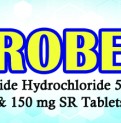PROBEN
Itopride Hydrochloride is a prokinetic benzamide derivative. These drugs inhibit dopamine and acetylcholine esterase enzyme and have a gastro kinetic effect. Itopride is indicated for the treatment of functional dyspepsia and other gastrointestinal conditions. It is a combined D2 receptor antagonist and acetylcholinesterase inhibitor.
- Categories : Gastrokinetic Agent
- Share Now :
PROBEN-50
Generic Name: Itopride Hydrochloride
Therapeutic Category: Gastroprokinetic agent
Pharmacological Class: Combined D2 receptor antagonist and acetylcholinesterase inhibitor
Composition: Each film-coated tablet contains Itopride HCl 50 mg
Pregnancy Category: C
Presentation: Available in the pack size as 10 tablets X 20 blisters
Mechanism of Action
Itopride has anticholinesterase (AchE) activity as well as dopamine D2 receptor antagonistic activity. It is well established that M3 receptors exist on the smooth muscle layer throughout the gut and acetylcholine (ACh) released from enteric nerve endings stimulates the contraction of smooth muscle through M3 receptors. The enzyme AChE hydrolyses the released ACh, inactivates it and thus inhibits the gastric motility leading to various digestive disorders.
Besides ACh, dopamine is present in significant amounts in the gastrointestinal tract and has several inhibitory effects on gastrointestinal motility, including reduction of lower esophageal sphincter and intragastric pressure. Itopride, by virtue of its dopamine D2 receptor antagonism, removes the inhibitory effects on Ach release.
The net effect is an increase in ACh concentration, which in turn, promotes gastric motility, increases the lower esophageal sphincter pressure, accelerates gastric emptying and improves gastro-duodenal coordination. This dual mode of action of Itopride is unique and different from the actions of other prokinetic agents available in the market.
Indications
- Functional Dyspepsia
- Gastroparesis*
- Anorexia*
- Heartburn
- Regurgitation*
- Bloating
- Nausea and Vomiting
- Other possible gastric, prolactin, or dopamine related conditions
Dosage
Route of administration: Oral
Adult: 50 mg three times a day; the dose may be reduced according to the patient's age and symptoms.
Proben cannot be prescribed to any child who is below the age of 16 years.
Best efficacy if taken one hour before or two hours after meal.
Pharmacokinetics
Absorption: Bioavailability is approximately 60%
Metabolism: Hepatic
Protein binding: Approximately 96%
Route of elimination: Renal
Half-life: 5.7±0.3 hours
Adverse Effects
The most common side-effects of PROBEN include mild to moderate abdominal pain and diarrhea.
Some other side effects that may occur include: rash, giddiness, exhaustion, back or chest pain, increased salivation, constipation, headache, sleeping disorders, dizziness, galactorrhea*, and gynecomastia*.
Contraindications
PROBEN is contraindicated in the following situations:
- Hypersensitivity to Itopride HCl or any of its ingredients
- Gastrointestinal hemorrhage: This medicine is not recommended for use in patients having internal bleeding of the stomach and intestine. This may be attributed to various reasons including a ruptured bowel (Gastrointestinal Perforation)
- Mechanical bowel obstruction: This medicine is not recommended for use in patients having a blockage in the intestine.
- Parkinson's disease: This medicine is not recommended for use in patients having dopamine related disorders like Parkinson's disease.
Precautions
- This drug should not be consumed continuously for an extended period when no improvement of gastrointestinal symptoms is observed.
- Children below 16 years of age
- Elderly population
Drug Interactions
- Since Proben has gastrokinetic effects it could influence the absorption of concomitantly orally administered drugs.
- Anticholinergic drugs may reduce the action of Proben.
*Terminologies:
Gastroparesis: A disease of the muscles of the stomach or the nerves controlling the muscles that causes the muscles to stop working.
Anorexia: A eating disorder characterized by low weight, fear of gaining weight, and a strong desire to be thin, resulting in food restriction.
Regurgitation: The expulsion of material from the pharynx, or esophagus, usually characterized by the presence of undigested food or blood.
Galactorrhea: A milky nipple discharge unrelated to the normal milk production of breast-feeding.
Gynecomastia: An enlargement of the male breast gland because of a hormonal imbalance.


